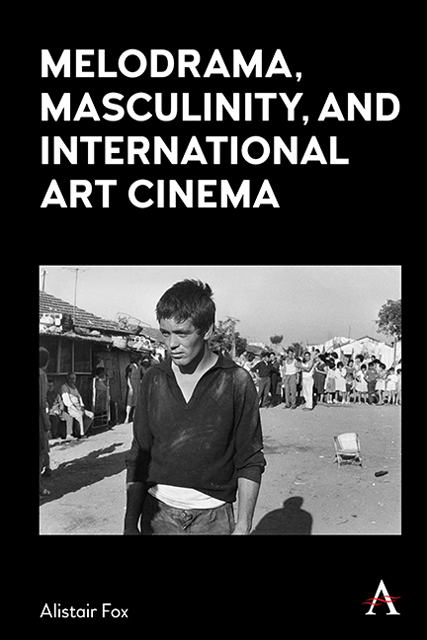Book contents
- Frontmatter
- Dedication
- Contents
- List of Figures
- Preface
- Acknowledgments
- Introduction
- Chapter 1 Italian Neorealism and the Emergence of the Male Melodrama: Vittorio De Sica’s Bicycle Thieves (1948) and Umberto D. (1952)
- Chapter 2 The Migration of Male Melodrama into Non-Western Cultures: Satyajit Ray’s The Apu Trilogy (1955–59) and “Fourth Cinema”
- Chapter 3 Hollywood Melodrama as a Vehicle for Self-Projection: Vincente Minnelli’s Tea and Sympathy (1956) and Home from the Hill (1960)
- Chapter 4 The Political Turns Personal: Neo-Neorealism and Pier Paolo Pasolini’s Accattone (1961)
- Chapter 5 Personal Cinema as Psychodrama: Ingmar Bergman’s Wild Strawberries (1957), Winter Light (1963) and Hour of the Wolf (1968)
- Chapter 6 François Truffaut and the Tyranny of Romantic Obsession: The Soft Skin (1964), Mississippi Mermaid (1969) and The Woman Next Door (1981)
- Chapter 7 Figuring an Authorial Fantasmatic: Jacques Demy’s The Umbrellas of Cherbourg (1964), A Room In Town (1982) and Parking (1985)
- Chapter 8 Rainer Werner Fassbinder and the Emergence of Queer Cinema: The Merchant of Four Seasons (1972), Fox and His Friends (1975) and In a Year with 13 Moons (1978)
- Chapter 9 Visual Aestheticism and the Queer Prestige Melodrama: Call Me by Your Name (2017) and Luca Guadagnino’s Desire Trilogy
- Conclusion
- List of Films Cited
- Select Bibliography
- Index
Chapter 5 - Personal Cinema as Psychodrama: Ingmar Bergman’s Wild Strawberries (1957), Winter Light (1963) and Hour of the Wolf (1968)
Published online by Cambridge University Press: 10 January 2023
- Frontmatter
- Dedication
- Contents
- List of Figures
- Preface
- Acknowledgments
- Introduction
- Chapter 1 Italian Neorealism and the Emergence of the Male Melodrama: Vittorio De Sica’s Bicycle Thieves (1948) and Umberto D. (1952)
- Chapter 2 The Migration of Male Melodrama into Non-Western Cultures: Satyajit Ray’s The Apu Trilogy (1955–59) and “Fourth Cinema”
- Chapter 3 Hollywood Melodrama as a Vehicle for Self-Projection: Vincente Minnelli’s Tea and Sympathy (1956) and Home from the Hill (1960)
- Chapter 4 The Political Turns Personal: Neo-Neorealism and Pier Paolo Pasolini’s Accattone (1961)
- Chapter 5 Personal Cinema as Psychodrama: Ingmar Bergman’s Wild Strawberries (1957), Winter Light (1963) and Hour of the Wolf (1968)
- Chapter 6 François Truffaut and the Tyranny of Romantic Obsession: The Soft Skin (1964), Mississippi Mermaid (1969) and The Woman Next Door (1981)
- Chapter 7 Figuring an Authorial Fantasmatic: Jacques Demy’s The Umbrellas of Cherbourg (1964), A Room In Town (1982) and Parking (1985)
- Chapter 8 Rainer Werner Fassbinder and the Emergence of Queer Cinema: The Merchant of Four Seasons (1972), Fox and His Friends (1975) and In a Year with 13 Moons (1978)
- Chapter 9 Visual Aestheticism and the Queer Prestige Melodrama: Call Me by Your Name (2017) and Luca Guadagnino’s Desire Trilogy
- Conclusion
- List of Films Cited
- Select Bibliography
- Index
Summary
The type of male melodrama created by the Italian neorealist filmmaker Vittorio De Sica, and the indigenous model developed by Satyajit Ray present masculinities viewed primarily from a perspective that conjoins social considerations with the personal. At the same time as these directors were exploiting melodrama to show the deleterious effects of social attitudes on the lives of men who were marginalized or dislocated for one reason or another, another filmmaker, Ingmar Bergman, was striking off in a very different direction. Rather than inviting spectators to observe the events in his films from an external perspective, Bergman chose instead to dramatize the very processes of a particular kind of masculine subjectivity—specifically, his own—anticipating the “inward turn” that would soon be evident in the films of neo-neorealists such as Vittorio De Seta (discussed earlier in Chapter 4). In the course of doing so, Bergman developed a form of cinema that would exert an enormous influence on the way in which the internal emotional experience of men would be depicted by subsequent filmmakers.
As one critic has observed, “most of Bergman’s films, including Persona (1966), are melodramas.” But they are melodramas with a difference, in that they combine the stylistic strategies of European art cinema with the characteristic preoccupations and situations of melodrama—problematic relationships, impediments to the attainment of happiness, and other triggers of strong emotion—to create what can best be described as a “melodramatic psychodrama”: the experiential revelation of an interior state of mind. Furthermore, Bergman’s films are distinguished by the fact that the vast majority of them are not adaptations of literary sources written by others, as is the case with Minnelli’s Tea and Sympathy, De Sica’s Bicycle Thieves and Ray’s Apu Trilogy, but rather fictions of his own invention with roots embedded in his autobiography. Consequently, Bergman’s films are deeply and directly personal to an unprecedented degree, making him, along with François Truffaut, one of the most important founders of a new type of film that one might call “personal cinema”—films in which the fictive representation constitutes a displaced expression of the filmmaker’s own engagement with his or her psychic realities, in particular those deriving from his or her actual autobiographical experience, even though the lines of connection between the diegetic world of the film and this personal engagement may be obscured by the strategies whereby the filmmaker converts this experience into a symbolic figuration.
- Type
- Chapter
- Information
- Melodrama, Masculinity and International Art Cinema , pp. 93 - 114Publisher: Anthem PressPrint publication year: 2022



